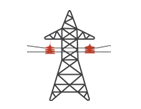Recent Federal Investments in Energy and Climate and What it Means for Oregon
Key highlights from the Infrastructure Investment and Jobs Act and Inflation Reduction Act
On November 15, 2021, President Biden signed the $1.2 trillion Infrastructure Investment and Jobs Act into law. Oregon expects to receive funding for energy efficiency, weatherization, grid resilience, and more over the next five years. On August 16, 2022, President signed a second bill into law, the Inflation Reduction Act. The Inflation Reduction Act contains approximately $369 billion for energy and climate investments, some of which will be available through the state energy office.
Below are funding estimates for a few of Oregon’s energy-related programs funded under this federal legislation over the next decade. The Oregon Department of Energy is committed to ensuring our state is well-positioned to leverage these dollars in support of a safe, equitable, clean, and sustainable energy future.
Please note, the U.S. Department of Energy has not released a timeline or criteria for when the funds will be distributed to states – we anticipate that it may not happen for a year or more. In the meantime, you can sign up for email updates by checking the box for the Federal Funding email list. We will provide updates as more details become available, including future opportunities to weigh in.
ESTIMATES:
State Energy Program
$5.6 Million in funding to the Oregon Department of Energy to support investments in clean energy, energy efficiency, and resilience.
Energy Efficiency
$3.2 Million for capitalization of an energy efficiency Revolving Loan Fund and Energy Efficiency and Conservation Block Grant program at the Oregon Department of Energy, which will support energy efficiency investments in Oregon communities.
Weatherization
$30 Million for Oregon Housing and Community Services to support weatherization and energy conservation services for low-income households.
Electric Vehicles
$52 Million to the Oregon Department of Transportation to construct electric vehicle charging infrastructure.
Resilience & Reliability
$50 Million. USDOE will allocate $50 million to Oregon to make investments that enhance the resilience and reliability of the electric grid.
Energy Auditor Training
Up to $2 Million. USDOE will competitively offer $40 million to U.S. states to train energy auditors to help home business owners identify opportunities save energy and money by using less energy.
Building Codes
$TBD. Competitive funding through multiple programs will be available to adopt improved building codes, support training and compliance activities.
HOMES program
$54 Million. Establishes a program to support whole-home energy efficiency upgrade rebates.
HEEHR
$54 Million. Establishes a program to provide rebates for high efficiency electric home appliances and associated costs.
Tax Incentives
There are numerous federal tax incentives available under the Inflation Reduction Act. These tax credits may be available for individual consumers who make qualifying purchases (see 25C Non-Business Energy Property/Energy Efficient Home Improvement Credit and 25 D Residential Clean Energy Credit) and programs for businesses (see the 179D Energy Efficient Commercial Buildings Deduction and the 45L Energy Efficient Home Credit). If you are interested in learning more about these incentives and credits, you can visit this link hosted by the N.C. Clean Energy Technology Center for summaries of individual federal clean energy tax incentives.
We recommend you consult with a licensed tax professional for information which pertains to your specific circumstances.
Other funding available
These laws include significant funding across a broad spectrum of areas. Oregon communities may have an opportunity to receive additional funding for energy efficiency and conservation, transmission lines, smart grid investments, zero emission school buses, projects to improve the resilience of ports, hydrogen commercialization and deployment, carbon capture and utilization, grants to public school facilities for energy efficiency and renewable energy improvements, building codes technical assistance and training, grants for charging infrastructure, battery recycling, smart manufacturing, efficiency improvements in affordable housing, greenhouse gas emissions reduction, environmental justice and more.
Note: Funding estimates are as of October 2022.









